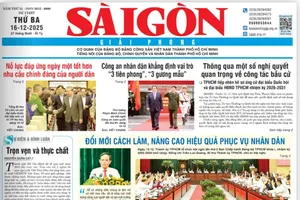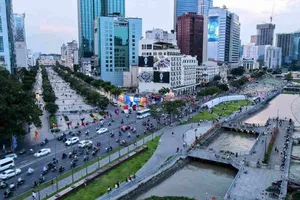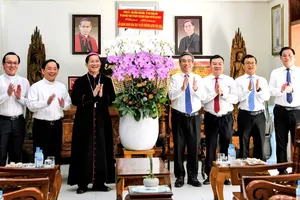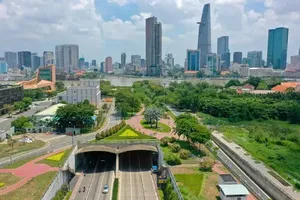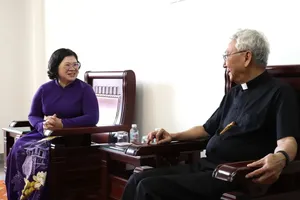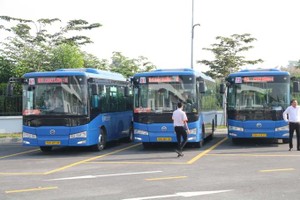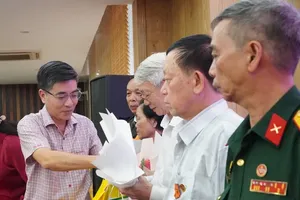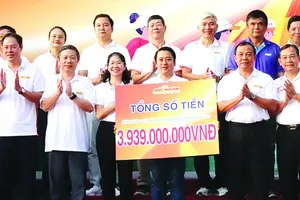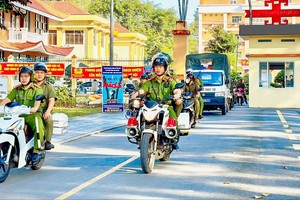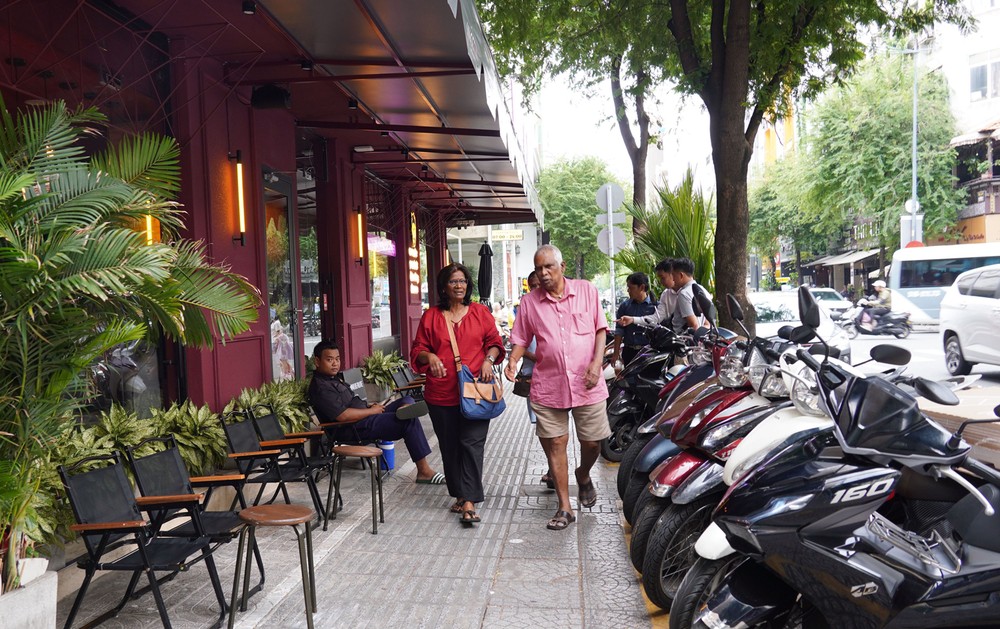
It has been over six months since the regulation on charging for the temporary use of a part of roadways and sidewalks came into effect on January 1, 2024. However, this policy has not been widely implemented, leaving residents eagerly awaiting legal business spaces. Recently, Vice Chairman Bui Xuan Cuong of the Ho Chi Minh City People's Committee has urged the urgent completion of procedures and the maximum application of information technology and digital transformation in fee collection for the temporary use of roadways and sidewalks.
One fine equals six months of sidewalk fees
At around 8 a.m. on an early June morning, Vy Cafe in Le Thanh Ton Street, Ben Thanh Ward, District 1, saw no empty tables. Outside the coffee shop, the owner had set up a row of folding tables and chairs for customers on the sidewalk. "Since the coffee shop has been able to use part of the sidewalk for a fee, I no longer have to rush with my coffee cup when I see the urban order management team coming. It is such a relief," one customer joked with the coffee shop owner.
Tran Thi Thanh Tuyen, the owner of Vy Cafe, explained that the small premises in the heart of District 1 forced the coffee shop to occupy the sidewalk when it was crowded. As a result, her coffee shop was fined frequently for infringing on the sidewalk.
"In the past, we were fined every few weeks, each time over VND5 million, which was really stressful. Now that District 1 is piloting the temporary use of part of the sidewalk for a fee, we've been able to set up tables and chairs outside for the past month without worry, no longer having to keep an eye out for the urban order management team," Tuyen said. She has registered to use a portion of the sidewalk temporarily, paying VND800,000 per month. So, one previous fine is equivalent to more than six months of the current sidewalk usage fee.
Nearby, at Queen Central Hotel (Ben Nghe Ward, District 1), the management appears relieved of the burden of parking and serving guests who wish to enjoy coffee on the sidewalk. Huynh Truong Ngoc Trinh, the hotel manager, mentioned that the hotel frequently faced fines for occupying pedestrian sidewalks. Upon District 1's pilot program for temporarily utilizing parts of the sidewalk with fees, the hotel promptly registered. "Foreign guests appreciate Vietnam's sidewalk culture, presenting us with a business opportunity," Ngoc Trinh remarked.
In District 1's pilot program for charging fees on portions of sidewalks, among the 11 selected roads, some allocate 1.5 meters for parking and another 1.5 meters for pedestrians, leaving only a narrow 0.5 meters. Nevertheless, numerous businesses have registered for temporary usage and strategically managed their operations, effectively attracting tourists. Upon observation, most businesses along these pilot roads have diligently arranged and utilized their allocated spaces, ensuring proper areas for parking and pedestrian pathways.
Progress acceleration
As of June 14, Mr. Nguyen Thanh Phat, Head of the Urban Management Department in District 1, reported that after 36 trial days, 230 households have registered to use sidewalk spaces temporarily, with nearly 1,800 square meters. The anticipated revenue from these registrations is about VND890 million. Ben Thanh Ward has the highest number of registrations, with 142 dossiers, and specifically, there are 84 registrations along Le Thanh Ton Street's sidewalks.
Once households register through the application, the Ward People's Committee verifies the information on-site, measures the location of the temporary sidewalk usage, and issues payment codes. On average, District 1 processes 13 registration dossiers per day.
"We have found that most people are in agreement and strongly support the trial implementation of fees for temporary sidewalk usage, along with the use of software in fee collection and registration management, helping the process transparent, convenient, systematic, and cashless," stated Mr. Nguyen Thanh Phat.
Alongside the fee collection for temporary sidewalk usage, urban order management teams across District 1 conduct daily patrols and monitoring to encourage residents to adhere to regulations regarding sidewalk use.
While District 1 has implemented its plan extensively, other localities are in the process of compiling lists and awaiting approval. District 10's People's Committee has submitted a list of roads eligible for temporary sidewalk usage fees, excluding traffic purposes, to the relevant authorities for review. The district is also conducting public consultations to gather opinions on temporary roadway and sidewalk usage.
Similarly, District 3 has forwarded a list of roads where a portion of the sidewalk can be utilized for businesses or parking to authorities for feedback. It is expected to be issued in June for public registration. Other localities have completed their reviews and submitted lists for approval by the authorities.
Vice Chairman Bui Xuan Cuong of the Ho Chi Minh City People's Committee has directed relevant departments, agencies, and local authorities to actively review and accelerate the progress of managing and collecting fees for temporary sidewalk and roadway usage. They are required to issue a list of eligible roads for temporary usage by June at the latest. Failure to meet this deadline will result in accountability of the unit heads to the Chairman of the Ho Chi Minh City People's Committee.


